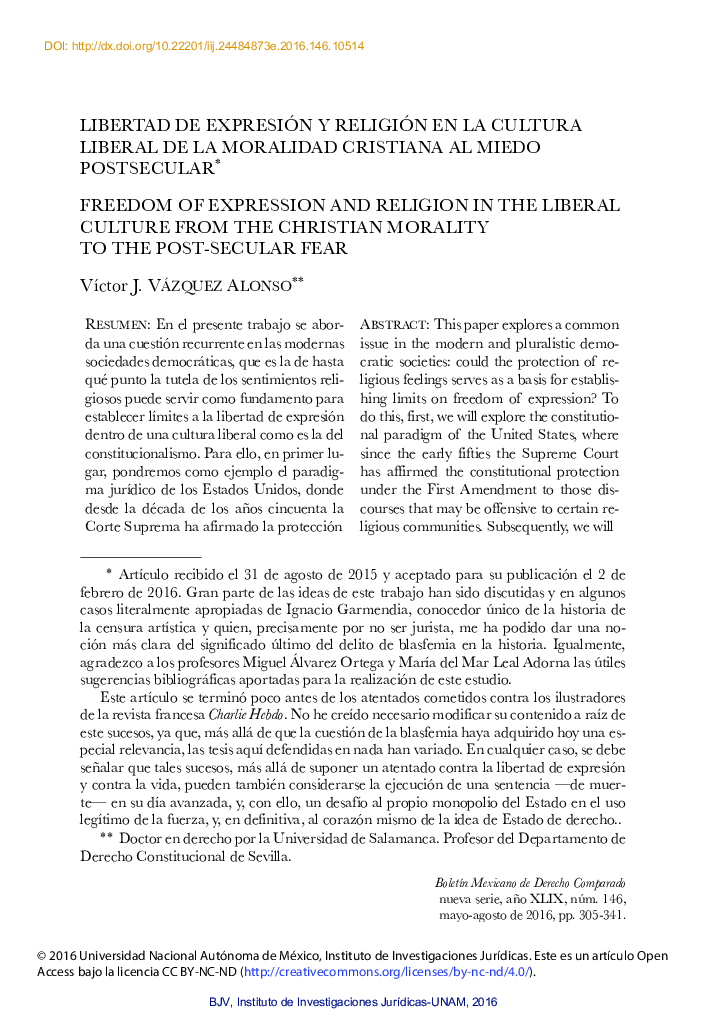| کد مقاله | کد نشریه | سال انتشار | مقاله انگلیسی | نسخه تمام متن |
|---|---|---|---|---|
| 7530873 | 1487593 | 2016 | 37 صفحه PDF | دانلود رایگان |
عنوان انگلیسی مقاله ISI
Libertad de expresión y religión en la cultura liberal de la moralidad cristiana al miedo postsecular*
ترجمه فارسی عنوان
آزادی بیان و دین در فرهنگ لیبرال اخلاق مسیحی به ترس پسیکولار
دانلود مقاله + سفارش ترجمه
دانلود مقاله ISI انگلیسی
رایگان برای ایرانیان
کلمات کلیدی
آزادی بیان، سخنان نفرت انگیز، آزادی مذهبی، پلورالیسم مذهبی، آزادی بیان، سخنان نفرت انگیز، آزادی مذهبی، پلورالیسم مذهبی،
ترجمه چکیده
این مقاله یک مسئله رایج در جوامع مدرن و دموکراتیک مدرن را مورد بررسی قرار می دهد: آیا حمایت از احساسات مذهبی به عنوان مبنایی برای ایجاد محدودیت های آزادی بیان عمل می کند؟ برای انجام این کار، ابتدا، ما پارادایم قانون اساسی ایالات متحده را بررسی خواهیم کرد، جایی که از اوایل دهه 50 دیوان عالی تحت حمایت قانون اساسی تحت اصلاح اول برای گفتگوهایی که ممکن است برای برخی از جوامع مذهبی تهاجمی باشد، تأیید کرد. پس از آن، ما از طریق قانون تطبیقی تجزیه و تحلیل خواهیم کرد که نحوه نگهداری قانونی مذهب در نظام های حقوقی اروپا، و چگونه آن را در بحث های خود با سکولاریزاسیون دولت تغییر داد. در ادامه، ما سعی خواهیم کرد که چگونه در جوامع پست مدرن، کفرآوری جدید، در حال حاضر خودی از جامعه سیاسی است، در حالی که جوامع جدید مذهبی خواستار حفاظت از سنت و نمادهای خود هستند. در نهایت، این مقاله تلاش خواهد کرد نشان دهد که چگونه حفاظت از باورها یا باورهای مذهبی علیه برخی از سخنان تهاجمی ناسازگار با مفروضات اساسی فرهنگ لیبرال است. برای این منظور، ما بین سخنان تنفر از سوی افراد خاص به دلیل وابستگی مذهبی و نوع دیگری از گفتمان که فقط منتقدان یا اعتقادات مذهبی یا عقاید مذهبی را که در هر صورت میتوانند از حمایت از آزادی بیان کنار بیایند، تفاوت خواهند داشت.
موضوعات مرتبط
علوم انسانی و اجتماعی
علوم اجتماعی
حقوق(قانون)
چکیده انگلیسی
This paper explores a common issue in the modern and pluralistic democratic societies: could the protection of religious feelings serves as a basis for establishing limits on freedom of expression? To do this, first, we will explore the constitutional paradigm of the United States, where since the early fifties the Supreme Court has affirmed the constitutional protection under the First Amendment to those discourses that may be offensive to certain religious communities. Subsequently, we will analyze through comparative law, how the religion's legal tutelage survives in the European legal systems, and how it has been gradually changed in its arguments with the secularization of the state. Subsequently, we will try to explain how in the postmodern societies the new blasphemous is now an insider of the political community while the new religious communities are the demanders of protection of their dogmas and symbols. Finally, this paper will attempt to show how the protection of beliefs or religious beliefs against certain offensive speech is incompatible with the basic assumptions of liberal culture. To this end, we will differentiate between hate speeches directed to certain individuals because of their religious affiliation, and other kind of discourse that only critics or affects religious beliefs or religious ideas which in any case could be excluded from the protection of freedom of expression.
ناشر
Database: Elsevier - ScienceDirect (ساینس دایرکت)
Journal: BoletÃn Mexicano de Derecho Comparado - Volume 49, Issue 146, 2016, Pages 305-341
Journal: BoletÃn Mexicano de Derecho Comparado - Volume 49, Issue 146, 2016, Pages 305-341
نویسندگان
VÃctor J. Vázquez Alonso,
